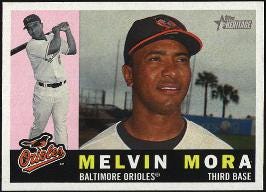Ballot 28: Melvin Mora

Melvin Mora
Played 13 years for four different teams
Two-time All-Star finished with 277 average with 1,503 hits. 27.3 WAR, 7.2 WAA
Pro argument: Had a Hall of Fame caliber season in 2004 and three other seasons that were almost as good.
Con argument: He was not good enough for long enough.
Deserves to be in Hall?: No
Will get elected this year?: No
Will ever …


